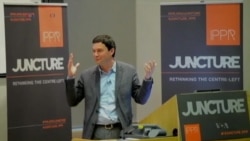WASHINGTON —
It’s an unlikely best seller, catapulting a soft-spoken French economist into rock star status and possible Nobel Prize contention.
Capital in the 21st Century by Thomas Piketty examines the history of income inequality in the U.S. and Europe since the 18th century.
The book is number one in the non-fiction book category of The New York Times and sold out in its first week on Amazon. It presents a compelling case for something many have long suspected - that the rich are getting richer.
“You know, if two-thirds of this growth goes to the top 1 percent, it’s not clear that this is a good deal for the rest of the population, Piketty said.
Using charts and tax data going back to the start of the industrial age, Piketty’s grand theory is that, over time, capital or wealth grows faster than economic output; but, the controversy centers on the author's policy solutions, among them a global tax on wealth.
Critics say such punitive measures would hurt everyone.
“I disagree with pretty much all of his policy recommendations, but, even beyond that, in the sort of purely analytical part, I think he exaggerates how much capital has grown over the last 100 years,” said Stan Veuger, a political economist at the conservative American Enterprise Institute.
Veuger argues much of the wealth accumulation in the U.S. has been due to the rise in home ownership; but, others say that does not account for the growing concentration of wealth among a privileged few.
“Perhaps there’s something more general about a problem where inequality in a democracy is going to lead to the rich prevailing despite the rules that we have on the books that should normally prevent that from being the case,” said New York University's David Stasavage.
And emerging economies are not immune. In China, Piketty says negative population growth will drive a wedge between rich and poor.
“Already, you know, inheritance of assets is becoming a big issue and access to real estate property in larger Chinese cities where you have some people inherit from the property of their parents. And, you know, some migrants will be completely unable to access property."
Piketty hopes the book sparks more discussion. That's a view shared by Yale professor Robert Shiller, who, after winning the Nobel prize for economics, told VOA that rising income inequality is the biggest problem facing the world.
“We should think now about a contingency plan for the possibility of much worse inequality and how do we stop that? Well, it has to be some form of taxation of the rich.”
At nearly 700 pages, Piketty's book is not an easy read, but both fans and critics say it's bound to generate heated discussion in a U.S. election year likely to be dominated by economic issues.
Capital in the 21st Century by Thomas Piketty examines the history of income inequality in the U.S. and Europe since the 18th century.
The book is number one in the non-fiction book category of The New York Times and sold out in its first week on Amazon. It presents a compelling case for something many have long suspected - that the rich are getting richer.
“You know, if two-thirds of this growth goes to the top 1 percent, it’s not clear that this is a good deal for the rest of the population, Piketty said.
Using charts and tax data going back to the start of the industrial age, Piketty’s grand theory is that, over time, capital or wealth grows faster than economic output; but, the controversy centers on the author's policy solutions, among them a global tax on wealth.
Critics say such punitive measures would hurt everyone.
“I disagree with pretty much all of his policy recommendations, but, even beyond that, in the sort of purely analytical part, I think he exaggerates how much capital has grown over the last 100 years,” said Stan Veuger, a political economist at the conservative American Enterprise Institute.
Veuger argues much of the wealth accumulation in the U.S. has been due to the rise in home ownership; but, others say that does not account for the growing concentration of wealth among a privileged few.
“Perhaps there’s something more general about a problem where inequality in a democracy is going to lead to the rich prevailing despite the rules that we have on the books that should normally prevent that from being the case,” said New York University's David Stasavage.
And emerging economies are not immune. In China, Piketty says negative population growth will drive a wedge between rich and poor.
“Already, you know, inheritance of assets is becoming a big issue and access to real estate property in larger Chinese cities where you have some people inherit from the property of their parents. And, you know, some migrants will be completely unable to access property."
Piketty hopes the book sparks more discussion. That's a view shared by Yale professor Robert Shiller, who, after winning the Nobel prize for economics, told VOA that rising income inequality is the biggest problem facing the world.
“We should think now about a contingency plan for the possibility of much worse inequality and how do we stop that? Well, it has to be some form of taxation of the rich.”
At nearly 700 pages, Piketty's book is not an easy read, but both fans and critics say it's bound to generate heated discussion in a U.S. election year likely to be dominated by economic issues.










